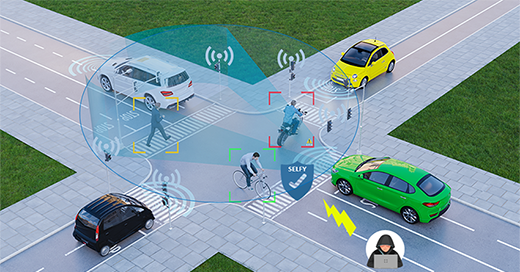Last modified on February 13, 2024

Towards safer, more resilient and cybersecure CCAM
CCAM related services and products will require high resilience to prevent service disruption and human harm in case of cyberattack. Such resilience heavily relies on the data and information collected by the CCAM systems and their fusion, sharing and processing. Therefore, guaranteeing a secure flow of generated and processed data between all stakeholders is vital for an efficient and robust management of the different services and systems in the CCAM context.
The SELFY project aims to promote a safe and secure operation amongst CCAM vehicles and mobility systems and services, and to guarantee secure data sharing. SELFY addresses such challenges by building a toolbox to improve CCAM system resilience against cyber threats, focusing on four pillars: Situational Awareness, Resilience, Trust and Secure Data Sharing.
Situational Awareness Cooperative Perception
One of the main objectives is the development of a situational awareness tool using sensor data fusion (Situational Awareness Cooperative Perception macro-tool). SELFY tackles the aggregation and fusion of onboard data to provide a single onboard perception from multiple sensors and relay information between vehicles and infrastructure.
Cooperative Resilience Healing System
SELFY partners have partially developed tools which provide intelligence, self-protection, self-defence and self-healing capabilities. An important element supporting the complete integration and cooperation of the SELFY tools is the virtual Security Operations Centre (vSOC).
Trust and Data Management System
SELFY’s partners have partially developed a set of tools to guarantee privacy, confidentiality, integrity and immutability of data.
Both the Situational Awareness and Collaborative Perception, the Cooperative Resilience and Healing System and the Trust Data Management System incorporate solutions with advanced technologies and algorithms based on artificial intelligence.
The toolbox will be tested in three validation environments through several use cases linked to three big scenarios: resilient cooperative mechanisms for Vulnerable Road Users’ safety, the secure empowerment of backend system for traffic management system and the robustification of a platoon of AVs.
Source: the original articles are published here


